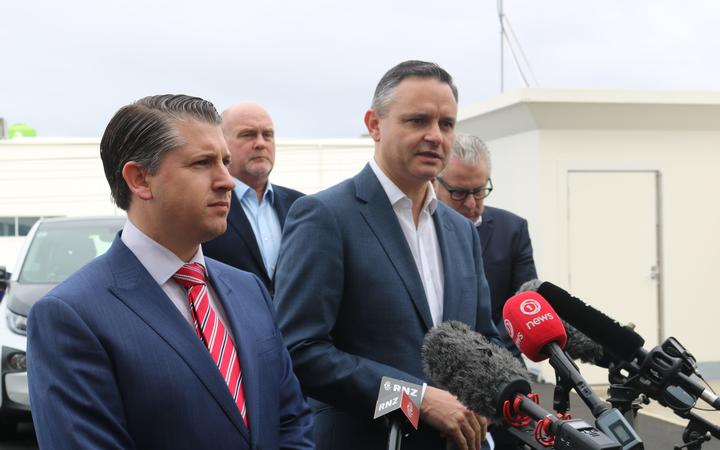
From July this year, people buying new electric vehicles (EVs) could get as much as $8625 back from the Government.
Transport Minister Michael Wood hoped the scheme would put the handbrake on gas guzzling vehicles making their way into the country.
"If we don't move forward with policies like the Clean Car Standard and the Clean Car Discount, New Zealand will become a dumping ground for the world's dirtiest vehicles.
"At the moment we have one of the dirtiest fleets coming into our country because of the lack of standard to date - we are resolving that," he said.

The cars need to be under $80,000 and have at least a three star safety rating.
The scheme will be expanded to include other low emission vehicles next year.
To pay for this, imported cars with high emissions will cost extra from January next year.
For example, a Toyota Hilux brought into the country could incur a fee of $2900.
"Importantly the policy only applies to new and used cars arriving in New Zealand, so the existing second hand market of cars that lower income families tend to purchase from will not be affected," Wood said.
The announcement comes hot on the heels of the Climate Change Commission's report on how the country should move towards net zero emissions by 2050.
Climate Change Minister James Shaw said transport has the fastest growing emission profile in New Zealand.
"Dealing with the energy that we use to get around within and between our cities is one of the, if not the most urgent of all our climate change challenges," he said.
The scheme is predicted to bring an additional 19,000 clean vehicles into the country's vehicle fleet in the first year of operation.

Drive Electric chair Mark Gilbert said hundreds of thousands of EVs were needed to meet the government's climate targets and the announcement is a step change.
"Most importantly, this announcement says to global car manufacturers New Zealand is serious about EVs."
He was hopeful that utes could eventually become electric.
Green MP Julie Anne Genter failed to get a similar scheme over the line last term, thanks to New Zealand First throwing a spanner in the works.
But now with just Labour at the wheel the scheme has been able to forge ahead - albeit with changes, such as the vehicle price cap.
RNZ understands that part of the reason the scheme wasn't announced sooner was because Labour and the Greens were fighting over details of the scheme.
However, both ministers would not say if any concessions had been made.
National Party transport spokesperson Michael Woodhouse said it was a tax by stealth.
"We welcome incentives, but my concern is that so many New Zealanders, tradies, large families, people in rural and remote areas are going to be asked to pay for this, but not actually have the choice to benefit from it.
"In essence it is a reverse Robin Hood system, they are taking from the poor to give to the rich - and that's just not right," he said.
National supported more positive moves such as exempting EVs from fringe benefit tax, extending road user charge exemptions and allowing EV users access to bus lanes and free parking, Woodhouse said.
Motor Industry Association chief executive David Crawford was happy with the announcement, especially the level of rebate on offer.
However, he thought the Government could go even further.
"The rules around allowing the discount when calculating fringe benefit tax and depreciation will go some way to addressing barriers to uptake of low emission vehicles by businesses.
"However, it stops short of the 50 percent reduction for electric vehicles we have consistently called for," he said.
Comments
We called for a 50 percent cut aye Mr Crawford?
I don't recall being asked, so no, you do not speak for me, especially as you were appointed and not voted into anything to give you the right to speak on my behalf as a motor vehicle user
Has anyone else picked up on the fact that we are currently burning increasing amounts of coal to top up our electricity generation, so bringing in more electric cars will mean even more coal needs to be burnt. Then there's the question of supplying the minerals not only for this generation of batteries, but the next wave of replacement batteries to follow. I know things need to change - but are we backing the right horse?
What actually needs to change is population control. We can tweak all of the emissions dials as much as we like, but when our global policies and practices all rely on increasing populations to continue to maintain our privileged lives, at some point something is going to break.
Welcome to the ponzi scheme of life.
Don't we already have this function of taking money from gas guzzlers to provide a benefit (roads free of charge) to ev users through the use of fuel taxes? Why do they need to widen this gap?
"Importantly the policy only applies to new and used cars arriving in New Zealand, so the existing second hand market of cars that lower income families tend to purchase from will not be affected," Wood said."
Hahahahahahahaha
My sides are hurting.
Either Wood has no idea of the economics of basic supply and demand of consumption goods, or he's delusional with his own virtue, or he's a blatant politician trying to sell a wreck.
All of the above I would say.
"EV scheme 'takes from the poor to give to the rich'" - how, exactly? This is not explained at all. National's proposals appear to pander to those who can afford EVs, even more!
They probably didn't explain it because it's a given. Generally EVs - especially those with high safety ratings - are more expensive and newer, so only higher income people can afford them, not only in vehicle price but also only the higher income people can afford to install their own personal charging station at home or to even have their own garage. Obviously this can be worked around but it's not ideal. Not only this but the more expensive vehicles get more of a rebate.
Of course the scheme is not perfect, but neither are National's suggestions and it seems a big stretch to say the poor will pay for it. As I understand it, after its initial setup the scheme should be self-funding. How many poor people does Woodhouse know that can afford brand new large gas guzzling SUVs?!?!
The National Party needs to stop clutching at their plastic straws and get more relevant to what's happening in the world.
I agree it is a subsidy to the rich. Further, if EV cars are so good, let the market dictate as we hear so much of the free market. Who is to pay for the roads from petrol tax? And with electricity high winter spot prices does the draw-off for these EV only exacerbate the costs of power.
Like so many things this Government does, this is a poorly thought out, ill-advised idea. There are many other ways of improving emissions from our transport stock, but these don't appear to have been considered. What we have is a smoke and mirror PR stunt from the queen of virtue signaling that is going to cost the majority of New Zealanders. No doubt the anti-car brigade will love it with no thought to the negative impact on the environment.
Consider it "redistribution" for all those billions middle NZ gives the poor.
All modern diesels have euro 5 emission systems on them. They are cleaner than a small 3-door hatchback. Cummings engines have brought out a near-zero emission diesel, so EVs are going to be an expensive thing in the past very quickly. Imagine 10 cars at a single charging station - see how the road rage goes then.
Robin Hode Locksley.
Beware of obscure metaphor.
We are a pluralist society, not necessarily au fait with Nottinghamshire legend, let alone reverse ones.












